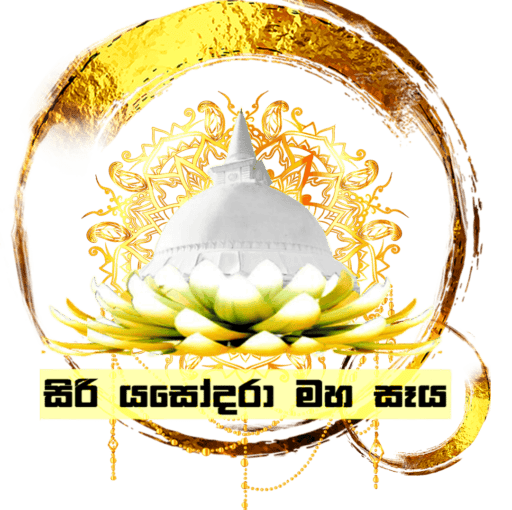Visākhā, Donor of Pubbārāma Monastery
During the time of Buddha Padumuttara, Visākhā was reborn into a rich man’s family in the city of Haṃsāvatī. On one occasion, when she was listening to a discourse by the Buddha, she saw a female lay disciple being named by Him as the ‘foremost in giving in charity’. She aspired to that distinction. After making an extraordinary offering, she expressed her aspiration before the Buddha, who prophesied that it would be fulfilled.
Then, after that life, she was reborn either in the deva-world or the human world for a hundred thousand world-cycles, in which five Buddhas appeared.
During the time of Buddha Kassapa, she was reborn as the youngest of the seven daughters of King Kikī, in the Province of Kikī. His seven daughters were: (1) Princess Samaṇi, (2) Princess Samaṇguttā, (3) Princess Bhikkhunī, (4) Princess Bhikhadāyika, (5) Princess Dhammā, (6) Princess Sudhammā and (7) Princess Saṃghadāsi.
These seven princesses were reborn during the time of Buddha Gotama as the seven distinguished ladies, (1) Khemā Therī, (2) Uppalavaṇṇā Therī, (3) Paṭācārā Therī, (4) Mahāpajāpati Gotamī Therī, the foster mother of the Buddha,(5) Dhammadhinnā Therī, , (6) Mahā māyā Devi, the mother of our Supreme Buddha, and (7) Visākhā, donor of the great Pubbārāma Monastery.
From among them, princess Samghadāsi (Visākhā), the youngest of the seven daughters of King Kikī then was reborn in the deva realm or the human realm for the entire interim period between two Buddhas (Kassapa Buddha and Gotama Buddha).
During the time of Buddha Gotama, she was conceived in the womb of Sumana Devī, the Chief Consort of Dhanañjaya the householder, son of Meṇḍaka the householder, in the town of Bhaddiya, in the Province of Aṅga. She was named Visākhā by her parents and kinsmen.
When Visākhā was seven years of age, the Buddha arrived in Bhaddiya in the company of many bhikkhus in His religious mission in the country. He visited Bhaddiya for the purpose of causing the Enlightenment of Sela, the brahmin, and other persons whose past merit had ripened for Enlightenment.
Five Personages with Great Past Merit
At that time, Meṇḍaka, the grandfather of Visākhā, was the chief among the five remarkable personages endowed with great past merit, namely, (1) Meṇḍaka the householder, (2) Candapadumā, his wife, (3) Dhanañcaya, the son of Meṇḍaka, (4) Sumana Devī, the wife of Dhanañcaya and (5) Puṇṇa, the servant of Meṇḍaka. (How remarkably endowed with great past merit these five person were, will be described here, condensed from the Commentary on the Dhammapada, Book Two, 18-Mala Vagga, 10-Meṇḍaka the householder.)
1). The Miraculous Power of Meṇḍaka The Householder
One day, Meṇḍaka, wishing to know his own power, had his granaries, 1250 in all, emptied. Then, after washing his head, he sat in front of the door of his house (or granaries) and glanced skyward. Suddenly, there rained from the sky heavy showers of top quality red rice which filled his 1250 granaries. Meṇḍaka further wished to know the miraculous powers of the members of his household and asked them to find out themselves.
2). The Miraculous Power of Candapadumā, Wife of Meṇḍaka
Then, Candapadumā, wife of Meṇḍaka, having adorned herself, took a measure of rice in the presence of everybody and had it cooked. She sat at a seat prepared at her front door and after announcing to all that anyone wishing to have cooked rice might go to her, she would ladled out, with her golden ladle, to every caller. Her rice-pot never diminished more than one ladle-mark, even after the whole day’s distribution.
-How Candapadumā acquired Her Name-
In her past existence, during the time of some past Buddha, this remarkable lady had offered alms-food to the Sangha, with her left hand holding the rice vessel and her right hand holding the spoon, filling the alms-bowl full. As the result of that good deed, in her present existence, her left palm bore the mark of a lotus flower while her right palm bore the mark of a full moon. Further, she had, during the time of some past Buddha, offered filtered water with her hand holding the water-strainer and going about from one bhikkhu to another. As the result of that good deed, her right sole bore the mark of a full moon while her left sole bore the mark of a lotus flower. On account of these distinctive marks on her palms and soles, she was named ‘Canda Padumā’ by her parents and kinsmen.
3. The Miraculous Power of Dhanañcaya, Son of Meṇḍaka
Dhanañcaya the householder, after washing his hair, sat at his door with one thousand coins of gold by his side, after making a public proclamation to the effect that anyone wishing to have money, could ask from him. He filled the vessel of every caller with money. After having done so, his money of one thousand coins remained the same amount.
4. The Miraculous Power of Samana Devī, The Daughter-in-law of Meṇḍaka
Sumana Devī adorned herself and sat in the open with a basket of seed grain, after making an announcement that anyone wishing to have seed-grain could ask from her. She distributed the seed-grain to every caller, filling their vessel. After having done so, her basket of seed-grain remained the same amount.
5. The Miraculous Power of Puṇṇa, The Trusted Servant of Meṇḍaka
Puṇṇa, after dressing decently as benefiting his status, yoked a team of oxen, on whose side he made his five-finger imprint of scented unguent and whose horns he decorated with gold, harnessing them to golden chains, and mounting a plough, he started ploughing Meṇḍaka’s field before the spectators. His plough made not just a furrow underneath his plough but made three extra furrows on either side, so that in one operation he accomplished seven times his effort.
Thus the whole populace of the Southern Island Continent obtained all their needs, such as rice, seed-grain, money, etc., from Meṇḍaka’s house. This is a brief description of the five personages with great past merit.
(Within the area of Rājagaha, King Bimbisāra’s domain, besides Meṇḍaka, there were four other householders, namely, Jotika, Jaṭila, Puṇṇa and Kāka Vailya. King Bimbisāra had within his domain these five householders with inexhaustible resources.)
When Meṇḍaka heard the arrival of the Buddha, he said to his grand daughter (daughter of Dhanañjaya):
“Grand daughter, what I am going to say is for the auspicious earning of merit for you and as well as for me. Go and welcome the Buddha, who is on His way, ride with your five hundred female attendants in each of your coaches together with five hundred maid servants.”
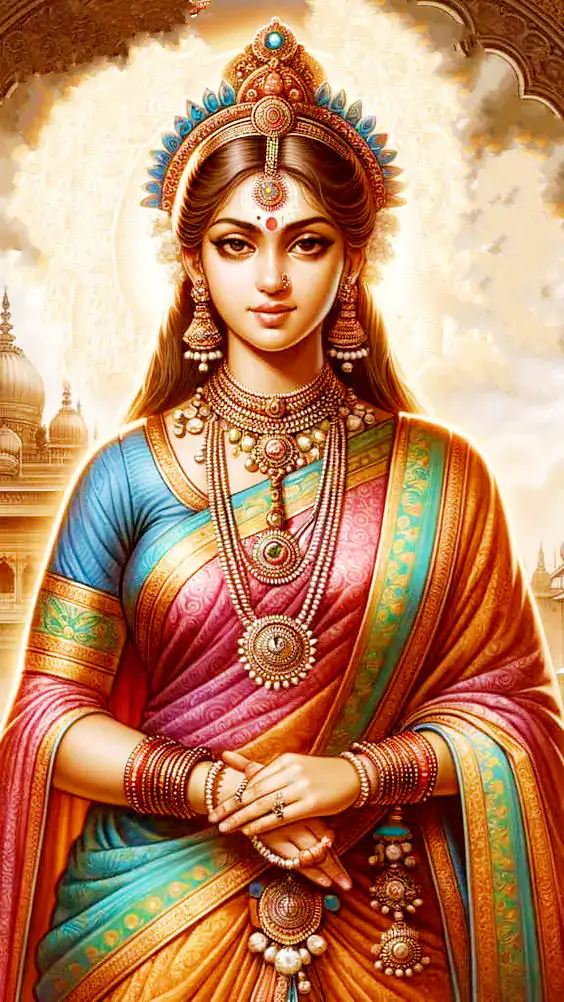
-
Save
During the time of Buddha Padumuttara, Visākhā was reborn into a rich man’s family in the city of Haṃsāvatī. On one occasion, when she was listening to a discourse by the Buddha, she saw a female lay disciple being named by Him as the ‘foremost in giving in charity’. She aspired to that distinction. After making an extraordinary offering, she expressed her aspiration before the Buddha, who prophesied that it would be fulfilled.
Then, after that life, she was reborn either in the deva-world or the human world for a hundred thousand world-cycles, in which five Buddhas appeared.
During the time of Buddha Kassapa, she was reborn as the youngest of the seven daughters of King Kikī, in the Province of Kikī. His seven daughters were: (1) Princess Samaṇi, (2) Princess Samaṇguttā, (3) Princess Bhikkhunī, (4) Princess Bhikhadāyika, (5) Princess Dhammā, (6) Princess Sudhammā and (7) Princess Saṃghadāsi.
These seven princesses were reborn during the time of Buddha Gotama as the seven distinguished ladies, (1) Khemā Therī, (2) Uppalavaṇṇā Therī, (3) Paṭācārā Therī, (4) Mahāpajāpati Gotamī Therī, the step mother of the Buddha and (7) Visākhā, donor of the great Pubbārāma Monastery.
From among them, princess Samghadāsi (Visākhā), the youngest of the seven daughters of King Kikī then was reborn in the deva realm or the human realm for the entire interim period between two Buddhas (Kassapa Buddha and Gotama Buddha).
During the time of Buddha Gotama, she was conceived in the womb of Sumana Devī, the Chief Consort of Dhanañjaya the householder, son of Meṇḍaka the householder, in the town of Bhaddiya, in the Province of Aṅga. She was named Visākhā by her parents and kinsmen.
When Visākhā was seven years of age, the Buddha arrived in Bhaddiya in the company of many bhikkhus in His religious mission in the country. He visited Bhaddiya for the purpose of causing the Enlightenment of Sela, the brahmin, and other persons whose past merit had ripened for Enlightenment.
Visākhā is established in Stream-Entry Knowledge at The Age of Seven
Visākhā gladly obeyed her grandfather and left home in five hundred coaches. Her grandfather might have thought of her riding the coach to the presence of the Buddha, such being his sense of self-importance, but Visākhā was a person of innate wisdom and considered it improper to go to the Buddha’s presence riding in a coach. As such, she dismounted at a reasonable distance from the Buddha, went on foot to Him, made obeisance to Him and sat in a suitable place.
The Buddha preached her a discourse which suit her mental frame of (the seven year old). At the end of the discourse, Visākhā and her five hundred attendants attained Stream-Enlightenment Knowledge and first Fruition.
Meṇḍaka also visited the Buddha, made obeisance to Him and sat in a suitable place. The Buddha preached a discourse to suit the mental frame of Meṇḍaka, at the end of which, he was established in the Fruition of Stream-Entry Knowledge.
He invited the Buddha to an alms-food offering in his house on the next day. On the next day, he made an offering of delicious food to the Buddha and His Sangha. He made the offerings on a lavish scale for fifteen days continuously. The Buddha stayed at Bhaddiya for as long as there were people who deserved to be enlightened.

-
Save
Visākhā and her Family moved to Sāketa
Pasenadi of Kosala, King of Sāvatthi, wrote to King Bimbisāra saying that as there was no householder of inexhaustible resources in his Kingdom, he requested him to send one such family to Kosala.
King Bimbisāra held a conference with his ministers, who said:
“Great King, we cannot afford to spare any of our householders who are of inexhaustible resources. But, to satisfy the King of Kosalans, let us send the son of one of your (five) such householders.”
King Bimbisāra agreed to the proposal. Dhanañjaya, son of Meṇḍaka, was requested to move to the Kosalan Kingdom.
(Herein, the commentary on the Dhammapada states that the Kosalan King and King Bimbisāra were brothers-in-law, in double sense. King Bimbisāra could not fail to satisfy the wish of the Kosalan King. He also could not offend his five famous Householders, and so he requested Dhanañjaya to go and settle in the Kosalan Kingdom. Dhanañjaya agreed and he was sent to the King of the Kosalan.)
After moving his family from Bhaddiya to the Kosalan Kingdom, Dhanañjaya identified a location which had great potentials for human settlement. He asked the Kosalan King as to whose territory that location belonged to. And being told that it lay within the Kosalan Kingdom, he further asked as to how far it was from Sāvatthi, the Capital. The King answered:
“It is one yojana from here to Sāvatthi.”
Then Dhanañjaya said to the King:
“Great King, Sāvatthi is not big enough for my householder to live in. If your Majesty would agree, I would settle in this location so that my big following can live in comfort.”
The King consented. And, Dhanañjaya founded a town at that location. Since it was a location of the settler’s choice, it was named “Sāketa”.
In Sāvatthi, Puṇṇavaḍḍana, son of Mīgāra the householder, had come of age. His father considered that it was time for his son to get married and he told his kinsmen to look for a bride for his son. The bride should come from a householder’s family. Intelligent and discreet scouts were sent to look for such a bride but none could be found in the City of Sāvatthi. The scouts therefore went to Sāketa.
One day, Visākhā went to a lake, which was outside Sāketa, accompanied by five hundred attendant maidens who were of the same age as her, to bathe and frolic in the water. At that time, the scouts from Sāvatthi had left Sāketa after without success to look for a suitable lady. They resorted to standing at the town’s gate. Then rain came pouring. Visākhā and her companions had left the town to seek shelter from the rain in a public rest-house. The five hundred maidens ran into the rest-house. None of them caught the eyes of the scouts as promising. But, coming behind these maidens was young Visākhā, who was walking towards the rest-house in her normal pace, disregarding the rain. The scouts suddenly recognized her beauty. They pondered:
“As regard personal appearance, there can be no other girl in the world who can equal to her. However, personal beauty is like a fresh ripe pomegranate. Her manner of speech needs to be assessed. We should start a conversation with her.” And so they addressed her in the following way:
“Little daughter, you walk like an elderly lady.”
Visākhā replied: “Fathers, why do you say so?”
“Your companions entered this rest-house by running, fearing to get wet. As for you, you came in your normal steps like an elderly lady. You do not seem to mind your dress being drenched. Supposing, an elephant or a horse were after you, would you take the same leisurely steps?”
“Father, clothing may be bought without difficulty. What does my dress matters? But my person is important to me, for a girl is like a piece of merchandise. If by running, I were to stumble and break my limb and become physically unsound, where is my worth as a likely bride? That was why I did not run?”
The scouts from Sāvatthi agreed among themselves that they had found a suitable bride for their master’s son; a girl fair in form as well as fair in speech, with a beautiful voice. They threw the bridal garland above Visākhā, who, understanding what it meant, acquiesced in the act by sitting on the spot. Migāra’s scout then put up a screen around the proposed bride. Having been thus ceremonially treated, Visākhā went back to her home accompanied by her maid servants. Migāra’s scout went along to the house of her father, Dhanañjaya the householder.
A conversation between Migāra’s men and Visākhā’s father about the proposed betrothal took place as follows:
Dhanañjaya: O men, what is your native village?
Elders: Householder, we represent Migāra the householder of Sāvatthi. Our master has learnt that you have a young daughter who is of marriageable age and he wants her as the bride for his son. We came to request the hand of your daughter
Dhanañcaya: Very well, men, your master is not our equal in wealth. However, he is of equal status by birth. It is a rare thing to meet one’s equal, both in status and wealth. Go back and tell your master that his proposal for betrothal is accepted.
Migāra’s representatives returned to Sāvatthi and reported to him:
“O householder, we have obtained the consent of Dhanañjaya the householder of Sāketa, to have his daughter betrothed to Puṇṇavaḍḍana.”
Mīgāra was overjoyed to find a bride from such a great family for his son. He sent an urgent message to Dhanañjaya to the effect that he would come and fetch the bride in a few day’s time, and would Dhanañjaya made suitable arrangements? Dhanañjaya replied that he would made every arrangement and requested Migāra to do the needful.
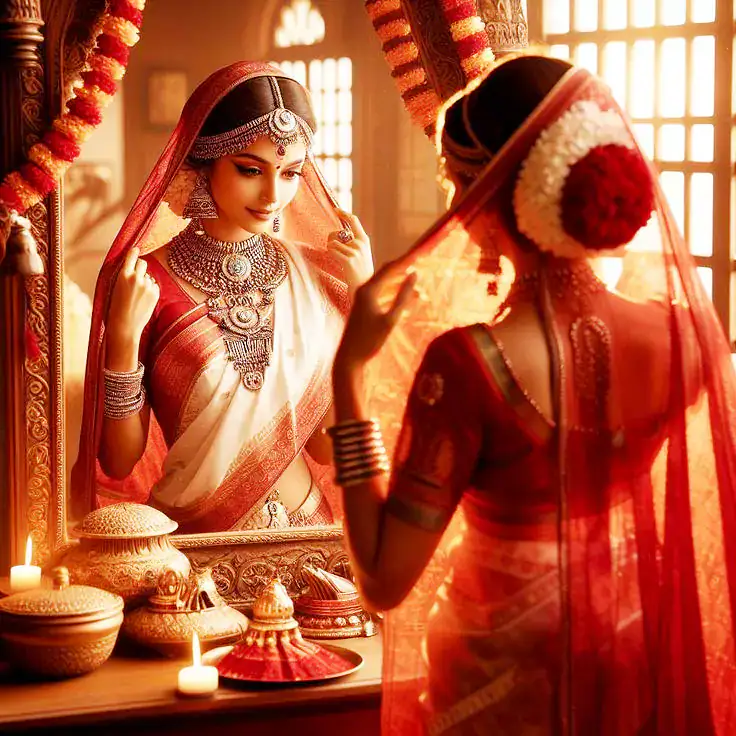
-
Save
The Kosalan King honoured The Betrothal
Mīgāra the householder went to the Kosalan King and sought permission to go to Sāketa to attend the wedding ceremony of his son, Puṇṇavaḍḍana, a trusted servant of the King, to Visākhā, daughter of Dhanañjaya the householder of Sāketa.
The King said: “Very well, householder, need we go with you?”
“Great King,” Mīgāra said, “how could we expect the presence of such an important personage as yourself?”
The King wanted to honour both parties to the betrothal with his presence and said: “So be it, householder, I will go with you.” And so the King went to Sāketa together with the householder.
When Dhanañjaya was informed of the arrival of Mīgāra and the Kosalan King, he greeted the King personally and escorted him to his house. He made careful arrangements to host the King and his army, Mīgāra and his entourage. Food, lodging, flowers, perfumes and every item of comfort was provided to all, everyone according to their need and status. He attended to these details personally so that every guest had the impression that Dhanañjaya the householder was doing a special favour to them.
Later on, one day, the Kosalan King said to Dhanañjaya through a messenger:
“Householder, we are here in too big a crowd. We might be causing a burden to you if we were to stay long. Maybe, you should think of the time for sending the bride to Sāvatthi.”
To which, Dhanañjaya replied through the messenger: “Great King, now is the raining season. Your army will find it difficult to make a journey. Let the provision of every need of your army be my responsibility. I would request your Majesty to return to Sāvatthi only when I make the send-off.”
From the time of the arrival of Mīgāra and his party, the whole of Sāketa was in a festive atmosphere. Three months passed in gaiety. The rain-retreat period had ended. It was October. The great ornamental dress for the bride was still in the goldsmith’s hand, nearing completion.
Dhanañjaya’s executives reported to him that although every item needed in hosting the big gathering from Sāvatthi was no problem but they had met with a shortage of fuel for cooking. Dhanañjaya ordered that all the old stables for his horses and sheds for his elephants be dismantled for fuel. But these structure lasted only fifteen days as fuel and the matter was conveyed to Dhanañjaya again, who said:
“Wood fuel would be hard to get during the raining period. So, open all my textile stores, make strips of rough cloth into ropes, soak them in oil vats and use them as fuel.”
In this expedient way another fifteen days supply of fuel for cooking was made available, by which time the great ornamental dress for the bride was completed too.
The bride was sent to the bridegroom on the next day, after the great bridal dress was completed.
On the day of her departure, Dhanañjaya called his daughter, Visākhā, to his side and gave this admonition:
“Dear daughter, a housewife, who is to serve her husband faithfully in his household, should know these principles and practice them accordingly:
(At that time Mīgāra was listening in the next room.)
“Dear daughter, a daughter-in-law living in the parents-in-law’s house:-
(1) should not take outside the fire that is inside her house, (that is, she should not tell people in other houses about the faults of her parents-in-law and husband);
(2) should not bring into her house the fire from outside (that is, when the neighbours speak ills of her parents-in-law and husband, she should not report it to them);
(3) should give only those who give back, (that is, she should lend only to those who punctually return what they have borrowed from her house);
(4) should not give those who do not give back, (that is, she should not give another loan to those who do not punctually return what they have borrowed from her house);
(5) should give others whether they give her or not, (that is, when poor relatives come to her house, she should give them whether they can afford to give or not);
(6) should sit well, (that is, she should stand up first at the sight of her parents-in-law and husband. It is not proper for her to remain sitting when she should stand up);
(7) should eat well, (that is, she should not eat before her parents-in-law and husband but she should serve them and eat only after making sure everybody has his or her food);
(8) should sleep well, (that is, she should not sleep in her bed before her parents-inlaw and husband do. She should sleep only after doing her duties towards them);
(9) should serve the fire respectfully, (that is, she should regard her parents-in-laws and husband as a great mass of fire or a poisonous serpent nāga king and look at them respectfully. She should not look at them disrespectfully by casting a side glance or frowning upon them);
(10) should worship the devas in the house, (that is, she should show respect to her parents-in-law and husband, regarding them as the devas occupying the foremost or most sacred place of the house).
On the following day, Dhanañjaya had all his guests assembled together and in the midst of the Kosalan army, appointed eight learned householders to be patrons of Visākhā at Sāvatthi, with the request that they, as a body, gave hearing and settled any disputes that might arose concerning her daughter. Then, he had the bride garbed in the great bridal dress of gold lace and jewels, worth nine crores. He gave her a hundred and fifty-four cartloads of money for her toiletry, five hundred maid servant, five hundred coaches which were drawn by thoroughbred horses and a variety of useful items in one hundred pieces for each kind. Having bequeathed these things, as his wedding present, in front of the assemblage, he first made a send-off for the Kosalan King and Mīgāra the householder.
When it was time for Visākhā to start her journey, Dhanañjaya called the controller of his cattle yards and gave these instructions:
“My men, my daughter will need in her new home milk cows and thoroughbred bulls for harnessing to her carts. Let a herd of cattle that will fill the road to Sāvatthi for an area of eight usabhas (140 spans) in breadth and three gāvutas in length (i.e. 3/4 yojana) be let out from the pens. The landmark for three gāvutas is from the pens to a certain ravine. When the foremost cattle in the herd reached that ravine, let a drum signal be made so that the pens can be closed in time.”
And the responsible persons complied faithfully. As soon as the pens were opened, the stoutest milk-cows only came out. But when the pens were closed, strong draught oxens and bulls jumped over the fence and followed Visākhā.
This was the result of Visākhā’s past merit, (more particularly, during the time of Buddha Kassapa, whenever she made offering of food to the Sangha, she used to persuade the offerees to take various delicacies even after they had taken their fill.)
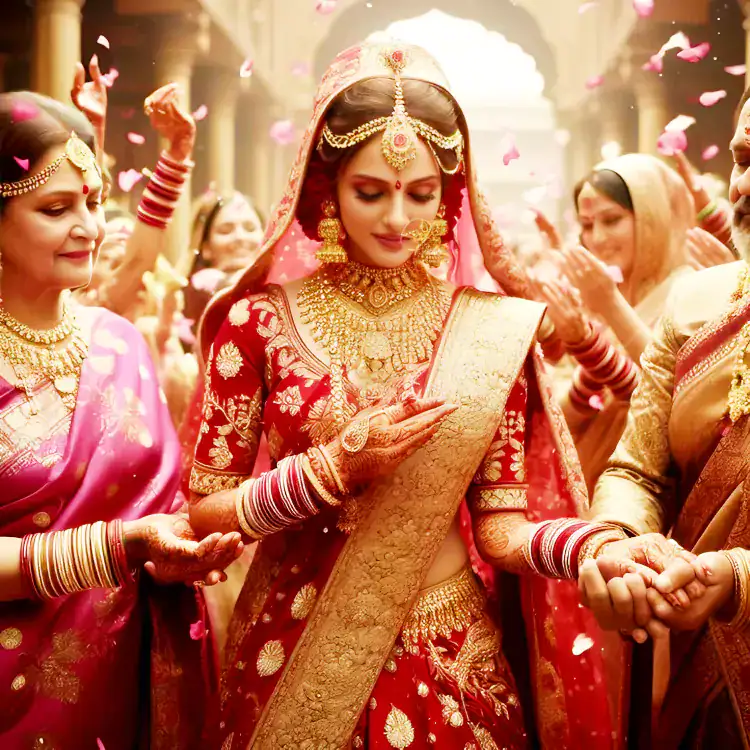
-
Save
Visākhā entered Sāvatthi
When Visākhā’s carriage arrived at the City of Sāvatthi, she considered whether she should enter the City seated in her coach or stand up, exposing herself to public view. When she remembered the great bridal dress (mahālatā) that she was wearing, she thought it wise to expose herself by standing in her carriage so that the greatness of her unique bridal dress would be seen by all.
As she did so, every citizen of Sāvatthi, who saw her was excited, saying among themselves:
“Here she is! The famous Visākhā! How exquisitely beautiful! And look at that gorgeous bridal dress she wears! How becoming she looks in that wonderful dress!”
Thus, Visākhā’s entry into her new residence at Mīgāra’s house was a flying success.
Right from the moment of her presence in Sāvatthi, the citizens were fresh with the memories of their long stay in Sāketa as guests of honour to Dhanañjaya, who had so lavishly and caringly treated them. So they started sending gifts to Visākhā according to their means. Visākhā distributed the gifts to various other citizens of Sāvatthi, ensuring that all houses received them. In this way, the citizens of Sāvatthi were soaked in charity from her first day there.
On the first night of her arrival at her father-in-law’s house, as soon as the first watch of the night had passed, (and it was bedtime) a thoroughbred female ass in Mīgāra’s house gave birth to a foal. She had her maid servants hold up the lamps and she attended to the delivery of the foal. She had the mother ass bathed in hot water and then had oil applied onto her body. After seeing through these operations, she went back to her chamber.
Wedding Reception at Mīgāra’s House
Mīgāra held a reception for seven days in his house, on the occasion of his son’s wedding. Even though the Buddha was staying in the Jetavana monastery, Mīgāra, being a follower of different faiths, disregarded the Buddha for the occasion of his son’s wedding, but, instead, he invited a houseful of naked ascetics. He called Visākhā to make obeisance to the ‘Arahants’. When Visākhā heard the word ‘Arahant’, she, being an ariya herself, a Stream-Enterer, eagerly went to see the so called ‘Arahant’. She was greatly disappointed to see the naked ascetic.
“How could these shameless fellows be ‘Arahant’?” she made her judgment and wondered why her father-in-law asked her to pay respect to them. “Fie! Fie!,” she uttered in disgust and turned away.
The naked ascetics, on their part, were angry at Visākhā’s behaviour. “Householder,” they said to Mīgāra, “can’t you get a better daughter-in-law? Why have you made this detestable woman, a follower of Samaṇa Gotama, a member of your household? Cast away the demon of a woman!”
But Mīgāra thought that he could not expel his daughter-in-law on the advice of the naked ascetics, for she came of a high class status. So, he had to palliate his teachers by saying: “Teachers, young people are reckless and say things intentionally or otherwise. Would you kindly keep your patience?”
Mīgāra was touched to The Quick
Being a good daughter-in-law, Visākhā attended on her father-in-law respectfully. She made him sit on a high seat, and served him with milk-rice in which undiluted milk was used. She ladled it out of gold spoon into a vessel and gave it to Mīgāra who relished the meal.
At that time, a bhikkhu, on his alms-round, stood at Mīgāra’s door. Visākhā saw the bhikkhu but, knowing her father-in-law as a follower of naked ascetics, she thought it wise not to tell him about the presence of the bhikkhu but merely moved herself aside so that the bhikkhu would stand in direct view of Mīgāra. Foolish as he was, Mīgāra did see the bhikkhu but pretended not to notice him with his face turned down to his meal only.
Visākhā knew that her father-in-law was purposely ignoring the bhikkhu, so she went to the bhikkhu and said:
“Empty-handed, I pay homage to you, Venerable Sir. My father-in-law lives only on old food.”
Hearing this, Mīgāra was irritated to wit. When Visākhā derided the naked ascetics, he could bear it. But now that his daughter-in-law said that he was eating excreta (which he interpreted Visākhā’s word “old food”), he could not bear it. He held away his hand from the vessel he was eating from and said angrily to his attendants:
“Keep this milk-food! Expel Visākhā from this house. Look, while I am eating this auspicious milk-food in my auspicious house, Visākhā says: ‘I am eating human excreta!’ ”
However, the whole of the household staff were Visākhā’s servants, and who would take Visākhā by the hand or by the feet and expel her? Far from doing physical violence against her, nobody in the house dared even to offend her by word.
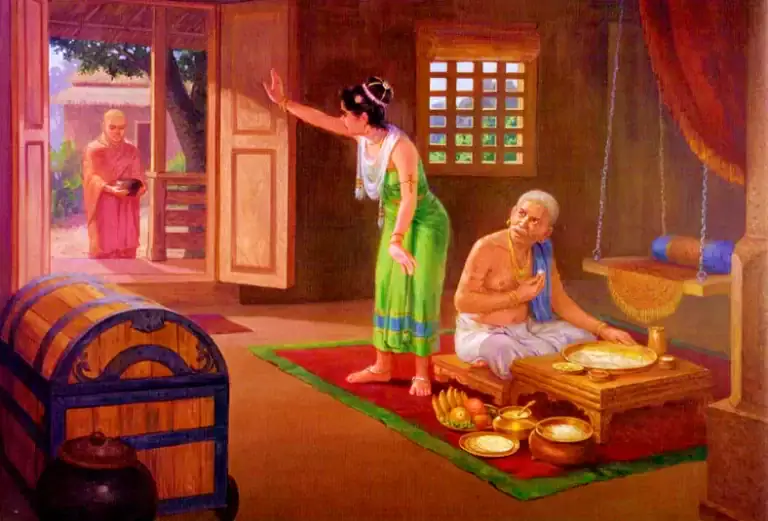
-
Save
Visākhā asserted Her Right
When Visākhā heard her father-in-law’s angry words, she spoke to him cordially and respectfully:
“Father, I am not obliged to go away from this house by your command, which is not right and proper. You have not brought me to this house like a water carrier girl. A good daughter, whose parents are still living, does not obey this kind of unlawful command. To see to righteous behaviour on all sides, my father had, on the day of my departure, appointed a panel of eight wise householders, saying: “If there should arise any problem concerning my daughter, you would be pleased to hear the case and settle it.” These eight people are my father’s trustees in whom my security lies. Would you refer my case to them now?”
How The Problem was resolved
Mīgāra thought Visākhā’s words were sensible. He sent for the panel of eight learned householders and laid his complaint, saying:
“Gentlemen, this girl Visākhā has not been in this house for a week and she insulted me, who lived in an auspicious house as someone who eats excreta.”
Elders: Now, daughter, did you say as the householder has alleged?
Visākhā: Fathers, my father-in-law might like to eat excreta. I never referred to him as an eater of excreta. The fact is that as he was eating milk-rice cooked with undiluted milk, a bhikkhu stood at his door for alms-food. My father-in-law ignored the bhikkhu. So, I went up to the bhikkhu and said: ‘Empty handed, I pay homage to you, Venerable Sir. My father-in-law lives only on old food.’ By this, I meant to say that my father-in-law does no deed of merit in his present existence but is living only on the fruit of his past merit.
Elders: Householder, in this case, our daughter is not at fault. She has spoken reasonably. Why should you be angry?
Mīgāra: So be it, gentlemen. But his young girl had from the very first night in this house ignored her husband and absented herself from the house.
Elders: Dear daughter, did you absent yourself as alleged?
Visākhā: Fathers, I did not go to any other place but the fact is that I was attending to the birth of a foal by a thoroughbred ass at the stable that night. I considered it my duty to do so. I had my maid servants held the lamps and I supervised the proper delivery of the foal.
Elders: Householder, our daughter had been dutiful and done what even your maid servants could not do. She had done it for your good only. And should you take it as an offence?
Mīgāra: So be it gentlemen. But I wish to complain about her father, Dhanañjaya’s admonition to her on the day of her departure from her house. She was told (1) ‘not to take out the fire from the inside of the house.’ How would it be possible for us not to give the fire when needed by our next door neighbours?
Elders: Dear daughter, were you told by your father as said by the householder?
Visākhā: Fathers, my father did not mean ‘fire’ in the ordinary sense. What is meant is that the affairs of my parents-in-law and his family should not be divulged to the servants who are outsiders. If I were to do that, I would be causing unnecessary trouble at home. My father uses the expression, ‘the fire from the inside of the house’ in this sense only.
Mīgāra: So be it, gentlemen. But then her father also said that (2) ‘she should not take the fire from outside into the house.’ How would it be possible for us not to take the fire from another house (i.e. outside our house), in case all the fire had gone out in our home?
Elders: Dear daughter, is that true?
Visākhā: Fathers, my father did not mean ‘fire’ in the ordinary sense. What is meant here is that what the servants say in criticising the family should not be reported to the members of the family. If I were to do so, I would be causing unnecessary trouble at home. My father used the expression, ‘the fire from outside’ in this sense only. Also when my father said:
(3) ‘You should lend only to those who return what they borrow.’ This is not to let those defaulters, who fail to return the things they borrow from me, get the better of me.
(4) ‘You should not lend to those who do not return what they borrow.’ This is not to let the defaulters exploit my goodness. This meant to be liberal to the poor relatives or friends who come to see me. I should make gifts to them regardless whether they can repay me or not.
(6) ‘You should sit peacefully.’ means I should show deference to my fatherin-law and mother-in-law. When they approach, I should stand up.
(7) ‘You should eat peacefully.’ means I should not eat before my parents-inlaw and my husband have eaten. Only when they have had sufficient to eat, then I should eat.
(8) ‘You should sleep peacefully.’ means I should not go to bed before my parents-in-law and my husband have gone to bed. Only after I have tended to their needs and they have retired, then I should go to bed.
(9) ‘You should tend to the fire.’ means I should consider my parents-in-law and my husband as the fire or the dragon that are to be always held in reverence. They should be attended on with respect.
Mīgāra: So be it, gentlemen. But what about her father’s admonition, ‘to worship the deities of the house’?
Elders: Dear daughter, what is it that your father-in-law wants to know?
Visākhā: Father, it is true that my father told me (10) ‘to worship the deities of the house.’ By these words, my father admonished me that when I become a housewife, I should give alms-food to bhikkhus who stand at my door for alms. Only after offering alms-food to them, should I eat.
Elders: Householder, you seem to please yourself by ignoring bhikkhus who come to you for alms-food.
Mīgāra found no word to retort this sarcastic remark and held down his face.
Visākhā’s Triumph
Then the eight learned householders said to Mīgāra the householder: “Householder, is there any other fault with our daughter?”
Mīgāra admitted that there was none. They continued: “Householder, in spite of her innocence, why did you expel her from your home?”
Then Visākhā stood up and said: “Fathers, I did not deem it wise to obey to my father-in-law’s rash command in expelling me. For my father had entrusted me to your care and to settle my problem concerning myself. Now that I am cleared of my fault, I am happy to go.”
Visākhā then returned to her private chamber and ordered her male and female servants to prepare coaches and do other things for travel. Thereupon, Mīgāra called the eight-men panel of trustees and apologised to Visākhā for his fault in their presence:
“Dear daughter, I had been reckless. Forgive me.”
Visākhā, seeing her opportunity, said to her father-in-law: “Dear father, I really forgive you for what is forgivable. Only that I wish to lay down a condition, which is, I, as an unshakeable devotee of the Buddha, cannot stay away from the Sangha, if only I be allowed to make offering to the Sangha freely, I shall stay here. Otherwise, I leave.”
To which Mīgāra promptly replied: “Dear daughter, you are at liberty to do so.”

-
Save
Mīgāra The Householder attained Stream-Entry Knowledge
Thereafter, Visākhā invited the Buddha to her house the next day for an offering of food. On the following day, the Buddha went to her house, accompanied by a big number of bhikkhus, who filled the house and were given seat. Naked ascetics, on learning the visit of the Buddha to Mīgāra’s house, took a keen interest and sat watching around it.
Visākhā made her food offerings and poured the libation water. After that she sent her assistant to inform her father-in-law that everything was ready to serve the meal to the Buddha and His Sangha, and invited him to attend to the Buddha personally. Mīgāra, who was under instructions by his teachers, the naked ascetics, replied to Visākhā:
“Let my daughter herself attend on the Buddha.”
Visākhā proceeded to do so, offering the Buddha with various kinds of delicious food and beverages. After that, she informed her father-in-law that the offering of food to the Buddha had finished and she invited him to join in listening a discourse by the Buddha.
Mīgāra’s past merit now began to tell on him, for he thought to himself:
“If I were to refuse the invitation it would be very wrong.”
He got an inner urge to listen to the Buddha’s discourse, and went to where He was sitting. However, his teachers, the naked ascetics, advised him to be screened off from the Buddha if he were to listen to His discourse. His servants therefore drew a curtain around the place where he was to sit.
The Buddha preached His discourse as if asserting His own power of letting any listeners to hear Him well, however hidden or far away from Him, whether divided by a wall or as distant as the whole extent of a world-system or thousands and thousands of world-systems.
As if a big mango tree laden with its golden ripe fruit was shaken from its trunk, the Buddha directed His sermon beginning with alms-giving, through morality and the celestial forms of existence.
(Note here that when the Buddha made a discourse, everyone among the audience, whether in front of Him or at His back, whether thousands of world-systems away, or even in the topmost Brahmā realm of Akaniṭṭha, feels that the Buddha is addressing him alone, face to face. It is like one’s relationship with the moon, which rides on the sky in her own course, but which seems to you to be always above your head. This unrivalled power of the Buddha is the result of His fulfilling the Perfections, more particularly, His supreme sacrifices in giving away His head or limbs, His eyes or heart, or His freedom by serving others as a slave, or as in Vessantara’s existence when He gave His young son and daughter to an old Brahmin, or His own wife, Maddī devī.)
——Commentary on the Dhammapada, Book 1——
At the end of the discourse, Mīgāra was established in the fruition of Stream-Entry Knowledge. He lifted the screen and laid prostrate at the Buddha’s feet in five-fold contact, and extolled Visākhā before the Buddha’s presence, with these words:
“Dear daughter, from this day on, you are my mother!”
Since then Visākhā came to be known as ‘Mīgāra’s mother’.
(In this connection, the commentary on the Aṅguttara Nikāya gives only a brief account of Visākhā, but for the benefit of the reader, the events connected with her will now be related based on the Commentary on the Dhammapada.)
Mīgāra’s Wife also attained Stream-Entry
After recognizing his daughter-in-law as his mother, Mīgāra went to the Buddha and prostrating himself at His feet, holding them adoringly and kissing them with his mouth, said:
“Venerable Sir, previously I had not known as to making gifts to what type of person is of great benefit. Now I have come to know it, thanks to my daughter-in-law. Now I am saved from the wretched destinations, the miserable states of hell. The arrival of my daughter-in-law, Visākhā, has brought me my welfare and happiness.” Further, he uttered this verse in elation:
“(Venerable Sir,) Today I have come to understand as to making gifts to what type of person is of great benefit. My daughter-in-law, possessor of noble characteristics, has indeed (due to any past merit) come to my house to my benefit.”
On the next day also, the good Visākhā invited the Buddha for another offering of food. Then, on the following day, her mother-in-law also became a Stream-Enterer. From that day onwards, Mīgāra’s house was an open door for all needs related to the Teaching.
******* “The arrival of noble person at a house,
Opens up the door to the Eight-fold Path
For its many residents,
Facilitating their entry to Nibbāna.” *******
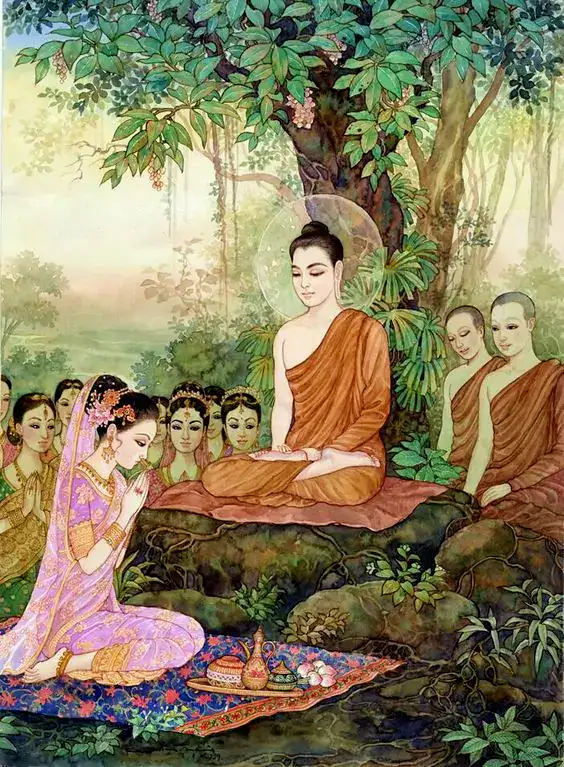
-
Save
Visākhā was honoured by Her Father-in-law
Then Mīgāra thought to himself:
“My daughter-in-law, Visākhā, is my great benefactor. I should repay my debt of gratitude to her. The mahālatā bridal gown is too cumbersome for her to wear daily. I shall give her a suitable dress of distinction which may be worn by her by day or by night and in all her bodily postures.”
So thinking, he had a solid but flexible and easy-to-wear garment worth a hundred thousand coins of gold, called Ghanamaṭṭhaka, made for Visākhā. When the dress was ready, he invited the Buddha and His Sangha to an offering of food. He let his daughter-in-law bathed in sixteen pots of scented water, and put on the special dress in the presence of the Buddha, in which she was to pay homage to the Buddha. The Buddha spoke words in appreciation of the offering and returned to the monastery.
From that time onwards, Visākhā’s life was one of meritorious deeds such as giving charity in which she took great delight, and which she could afford to do much as she like. She won wide recognition as the great female lay supporter after she obtained eight special privileges as boon from the Buddha.
(The eight privileges as boons are:
(i) lifelong privilege of donating robes to the Saṇgha for use in the raining season,
(ii) the privilege of offering food to visiting bhikkhus,
(iii) the privilege of offering food to travelling bhikkhus,
(iv) the privilege of offering food to sick bhikkhus,
(v) the privilege of offering food to the bhikkhus who were nursing the sick ones,
(vi) the privilege of offering medicine to sick bhikkhus, (vii) the lifelong privilege of offering gruel (for breakfast),
(viii) the privilege of offering under lower robes to bhikkhunīs.)
Her story was comparable to that of the moon in the sky. Her reputation as the head of a big family also was noteworthy, for she had ten sons and ten daughters who had, (like herself) ten sons and ten daughters each. These four hundred grand-children had also ten sons and ten daughters each. Thus making a total of eight thousand great grand-children.
***********************
The ancient Theras versified this fact thus:
“For having twenty children, four hundred grand-children and eight thousand great-grand-children, Visākhā is renounced throughout the Southern Island Continent.”
Some Distinctive Qualities of Visākhā
Visākhā lived up to 120 years of age. Not having a single grey hair, she looked always as if the age of a sixteen year old. When she went to the Buddha’s monastery, accompanied by her children, grand-children and great-grand-children, she was indistinguishable from them.
When people saw Visākhā walking, they never felt satisfied with watching her walk. But when she stood, she looked as graceful; when she sat or when she was lying down, people thought her very graceful in that posture.
She had physical might equivalent to five great elephant bulls. On one occasion, the King of Kosala, wishing to test her reputed strength, let loose a great elephant bull in her direction. The beast ran towards her menacingly with its trunk uplifted. (Visākhā’s five hundred companion girls ran away in fear. Some of her five hundred companions hugged her, (as if to safeguard her).
“What’s up?” she asked them.
They said: “Maiden, the King wants to test your strength and sent an attacking elephant bull at you!”
Visākhā thought: “What use with running away from this beast? And if I were to handle it squarely, it would be crushed.” So thinking, she gently took the beast’s trunk in her two fingers and turned him off, which sent him reeling. The out lookers cheered Visākhā coolly and then proceeded home.
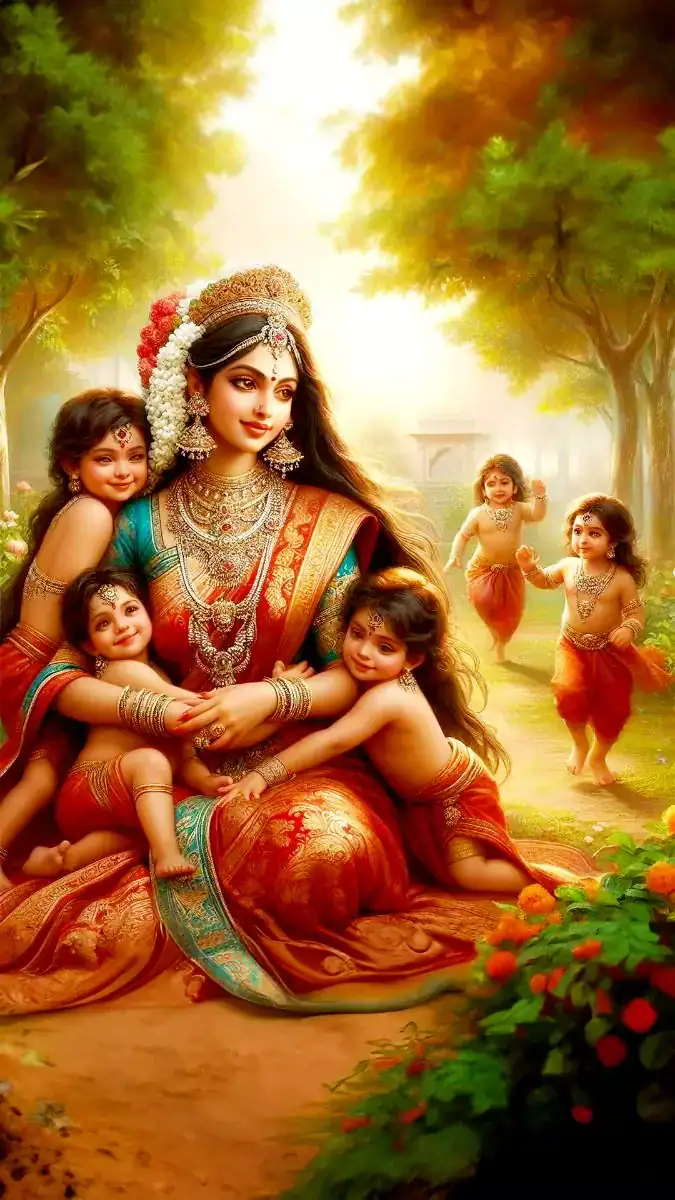
-
Save
The Construction of The Pubbārāma Monastery
Visākhā was widely known as the auspicious lady, not only for her perennial beauty, but also for the health and robustness of her children and grand-children for none of them died before the end of their life span. The citizen of Sāvatti would invite Visākhā as the guest-of-honour whenever they held ceremonial offerings.
One day, after attending such a function and was proceeding to the Buddha’s monastery, she thought it lacking in modesty if she went before Him, attired in her gorgeous mahālata dress. So, at the entrance to the monastery, she entrusted it to her maid servant who was reborn into the world due to Visākhā’s past great deed, for she had to be, like Visākhā, as strong as the equivalent of five great elephants bulls.
(She left the great gown with her to be kept with her until she come back from the Buddha’s presence after hearing a discourse.)
Leaving the mahālata dress with her maid-servant and putting on the Ghanamaṭṭhaka dress instead, Visākhā went before the Buddha and listened to a discourse. After the discourse, she made obeisance to Him and left the monastery. The maid-servant left the mahālata dress at the place where she was listening to the Buddha’s discourse and forgot to collect it when she left.
It was Venerable Ānanda’s routine duty to collect things left through forgetfulness of visitors to the Buddha’s monastery. On that day, when he found Visākhā’s mahālata dress, he reported it to the Buddha who asked him to store it away in a suitable place. The Venerable Ānanda picked it up and hung it at one end of the flight of stairs.
Visākhā then went around the various places in the Jetavana monastery together with Suppiya, a well-known female lay-disciple, to find out the needs of the guest bhikkhus, the sick bhikkhus, and bhikkhus who were on a journey. It was usual for junior bhikkhus and novices who needed ghee or honey or oil to bring containers to be filled by the two visiting ladies on such rounds.
After she had visited the sick bhikkhus, the junior bhikkhus and sāmaṇeras and had done attending to their needs, she left the Jetavana monastery by another gate. Before leaving the monastery compound, Visākhā asked her maid-servant to bring the mahālata dress for her to wear. Then only the maid remembered about it and said:
“My lady, I have forgotten to pick it up.”
“Then, go and fetch it,” instructed Visākhā. “But,” she continued, “in case the Venerable Ānanda were to have moved it to another place himself, say to him that the dress is to be considered as donated to him.”
She said this because she knew that the Venerable Ānanda always kept in his custody all articles left by forgetful visitors of all the four classes to the Jevatana monastery.
When the Venerable Ānanda saw Visākhā’s maid-servant, he asked her why she returned. And being told of the mahālata dress, the Venerable Ānanda said to her:
“I have hung it at one end of the stairway. Go and get it.”
Then she said: “Venerable Sir, my lady has instructed me that if the dress had been held in the hand of your reverence, she would not take it back because she would deem it already donated to you.”
The maid went back to Visākhā and reported the matter to her.
Then, Visākhā said to her: “My girl, I consider it donated to the Venerable Ānanda. I have no desire to wear it after the Venerable had handled it. However, keeping it in his custody would be troublesome to him. I will donate something that is proper for the Sangha to use. Go and get it.”
And the maid did as she was bidden. Visākhā sent for the goldsmith and let them appraise the value of the mahālata dress. The goldsmith said:
“This dress worth nine crores in material value plus a hundred thousand in workmanship.”
Visākhā let the mahālata dress being displayed on an elephant and put it for public sale.
But there was no one who could afford to buy a dress worth a fortune. Moreover, there were no women who could withstand the sheer weight of that bejewelled great gown.
As a matter of fact, there were only three women on earth who could afford and wear this kind of dress. They were:
(1) Visākhā.
(2) Mallikā (a native of Malla province) wife of Bandula the Commander-in-Chief in Kosala.
(3) Sujātā, Wife of the Householder of Bārāṇasī
Since there was no buyer of the great dress, Visākhā herself bought it at the appraised price (of nine crores and a hundred thousand). She put the money in a cart and took it to the Jetavana monastery where, after making obeisance to the Buddha, she said to Him: “Venerable Sir, the Venerable Ānanda, in keeping my mahālata dress in his custody, had handled it. From that time onwards, it is not proper for me to wear it. Therefore, I have sold it out for the benefit of the Sangha and in such a way the Sangha might properly put it to use. Since there was no one who could buy it, I have now bought it at its sales value of nine crores and a hundred thousand. In which way, out of the four requisites should this money be utilized?”
The Buddha said: “It would be fitting if you build a monastery for the Sangha near the eastern gate of this city (Sāvatthi).”
Visākhā was very glad to hear this. She bought a piece of land for the site of the monastery for the price of nine crores. The building was to cost her another nine crores. Construction began soon.
Venerable Moggallāna supervised The Construction of The Monastery
One morning, the Buddha reviewed the world for beings deserving of Enlightenment and he saw Bhaddiya, the son of the householder of Bhaddiya, who had had his former existence in the deva realm. So, after His meal in the house of Anāthapiṇḍika, the Buddha went in the direction of the northern gate of Sāvatthi.
(It may be noted that the Buddha usually received offering of alms-food at Visākhā’s house. After which, He would go through the city’s southern gate to Jetavana monastery as His residence. If, He received His alms-food from Anāthapiṇḍika, He would go through the city’s eastern gate to the Pubbārāma monastery as His residence. When He left the city by the northern gate, people understood that He was taking a journey.)
When Visākhā heard the news of the Buddha taking the northern gate, she went to see Him and said:
“Venerable Sir, are you making a journey?”
The Buddha replied: “Yes, Visākhā, it is so.”
Visākhā said: “Venerable Sir, I have sacrificed such big fortune (of nine crores) to build a monastery for your use. Would you wait till the building is complete?”
“Visākhā, my present trip cannot be postponed.”
Then, Visākhā understood that the Buddha had in mind some prospective disciple whose past merit has ripened, and said:
“Venerable Sir, in that case, would you leave behind some bhikkhus who would supervise the construction?” Thereupon, the Buddha said:
“Visākhā, take the alms-bowl of the bhikkhu of your choice.”
Visākhā had a natural liking for the Venerable Ānanda. However, she thought that the Venerable Mahā Moggallāna, with his great powers, would be a real help in the expeditious completion of her monastery. So, she took the alms-bowl of the Venerable Moggallāna, who glanced towards the Buddha. The Buddha said to the Venerable:
“Moggallāna you and your followers of five hundred bhikkhu will stay behind.” And so the Venerable Moggallāna became the bhikkhu to supervise Visākhā’s monastery construction.
By the great power of the Venerable Mahā Moggallāna, big distances as much as fifty or sixty yojanas were made every day by the people who collected building materials. In carrying them too, they could do it without great hardship. No mishaps such as broken axles in the carts ever occurred.
Soon, the two-story seven-tier monastery was completed on a clear and level site of eight karisas wide. The seven-tier monastery had five hundred chambers on the ground floor and five hundred chambers on the first floor. Around the main building, she added, for better perspective and practical usefulness, five hundred meditation cubicles, five hundred smaller tiered monastic dwellings and five hundred stairways.
The Donation Ceremony that lasts for Four Months
The Buddha returned from His tour after nine months. By that time, the construction of the Pubbārāma monastery had been completed, thanks to the supervision of the Venerable Mahā Moggallāna.
Visākhā had a broad gold plate, about the size that might contain sixty water pots, fashioned for the pinnacle of the monastery. When she heard that the Buddha was returning to the Jevatana monastery, she invited Him to stay in her new monastery, known as the Pubbārāma (the eastern) monastery, together with His Sangha, because she wanted to hold ceremonies marking the donation of the monastery. She said:
“Venerable Sir, I would request the Bhagavā to stay in this monastery for the four raining months.”
The Buddha having acceded to her request, she made great offerings of food to the Buddha and His Sangha. Then, a female friend of Visākhā went to her and requested a favour:
“Friend Visākhā, I would like to donate a piece of floor cover worth a hundred thousand gold coins to your monastery. Kindly show me where I should put it.”
Visākhā replied: “Very well, friend, look for the place yourself, for if I were to say: ‘There is no place for your floor cover, you might misunderstand me.”
Her friend went about the great monastery, inspecting very part of it, at both the two storeys, but could not find a spot which was not already covered with flooring material of the same quality or better than the one she had brought. She was greatly disappointed and wept in a corner.
The Venerable Ānanda saw her weeping and asked her the reason. She told him her story. The Venerable Ānanda then consoled her:
“Do not worry, I will show you the spot where you may spread your flooring material,” and he pointed to her an uncovered spot at the end of the stairway which was the place for the Sangha to wash their feet. She was told that all the bhikkhus would step over that flooring before the monastery, after washing their feet and that would be a really meritorious thing for her as the donor. (That was the only spot which Visākhā’s attention missed.)
Offerings of The Four Bhikkhu Requisites to The Sangha
For four raining months, Visākhā made offerings of the four bhikkhu requisites to the Buddha and His Sangha. On the full moon of Ill (November) she donated robe material of superior quality. The lowest quality received by a newly admitted bhikkhu was worth one thousand. All the bhikkhus also received the four-foods concoction, catu madhura, to fill their alms-bowl full. The four months long offerings that marked her donation of the Pubbārāma monastery cost her nine crores.
Thus, the site costing nine crores, the building, nine crores, and the ceremonial offering, nine crores, made a total of twenty-seven crores which Visākhā incurred in her donation towards the Pubbārāma monastery, a sum of money which very few women did on such a scale, and more remarkable for her since she lived in the house of a non-believer.
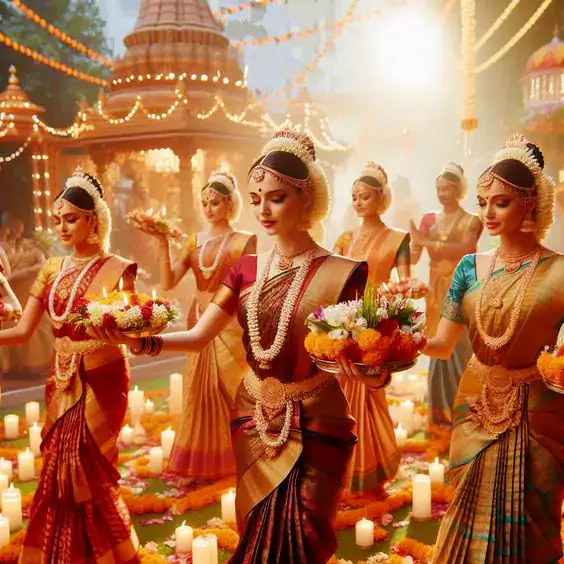
-
Save
Exultation of Visākhā on Her Good Deed
On the evening of the end of the four month long ceremony, Visākhā amidst her big company of offerings was very happy in her thought that her lifelong ambition had been fulfilled. In sheer exultation, she sang the following five stanzas in a wonderfully melodious voice while going round the big monastery:
(1) “Ah! My cherished ambition with the thought: ‘When would I (having made my earnest wish and acquiring merit over a hundred thousand world-cycles) be able to build a monastery of fine cement concrete structure that would delight every visitor, (bhikkhu and layman alike)? It is fulfilled now!
(2) “Ah! My cherished ambition with the thought: ‘When would I be able to donate monastic living place for the Sangha, complete with couch, reclining chair, cushion, pillow, etc.?’ This thought that had occupied my mind, setting Nibbāna as my goal, since the time of Buddha Padumuttara. It is fulfilled now!
(3) “Ah! My cherished ambition with the thought: ‘When would I be able to make offerings of food to the Sangha, (the merit whereof accomplishing long life, personal charm (beauty), happiness, strength and intelligence), comprising the seven types of food offering, such as food offering by casting lots, etc.; rice cooked in meat, etc.?’ This thought that had occupied my mind, setting Nibbāna as my goal, since the time of Buddha Padumuttara. It is fulfilled now!
(4) “Ah! My cherished ambition with the thought: ‘When would I be able to donate robes to the Sangha, that is robes made of costly Kāsi cloth, cloth made from cotton fibre, etc.?’ This thought that had occupied my mind, setting Nibbāna as my goal, since the time of Buddha Padumuttara. It is fulfilled now!
(5) “Ah! My cherished ambition with the thought: ‘When would I be able to donate to the Sangha the physician’s formula as medicine, that is, the four-food concoction comprising ghee, honey, sesame oil and molasses?’ This thought that had occupied my mind, setting Nibbāna as my goal, since the time of Buddha Padumuttara. It is fulfilled now!”
——Commentary on the Dhammapada——

-
Save
Visākhā was named The Foremost
In the morning, Visākhā’s house was aflame with the colour of the saffron robes of bhikkhus coming and going freely, and the atmosphere was vibrating with the movement of bhikkhus whose robes filled the air with the odour of the dye-stuff. As in the house of Anāthapiṇḍika, Visākhā’s house had meals cooked for offering to bhikkhus of varying needs, namely, the travelling ones, the sick ones, the visiting ones.
In the morning, Visākhā offered food to these bhikkhus. In the afternoon, she would go to the Buddha’s monastery with her maids, carrying medicinal properties, such as ghee, butter-milk, honey and molasses, and also eight kinds of beverages made from Eugenia, mango, the Indian butter fruit, the Uraria lagopoides, the madhuka drink, two kinds of banana, and nectar of the lotus and offered them according to the needs of the bhikkhus.
Then she would listen to a sermon by the Buddha before returning home. (This is a typical day for Visākhā, replete with meritorious actions.)
Therefore, on one occasion, the Buddha was naming foremost female lay-disciple according to their merit, He declared:
“Bhikkhus, among My female lay-disciples who delight in charity, Visākhā is the foremost.”
(From the book : The Great Chronicle of Buddhas | by Ven. Mingun Sayadaw)
